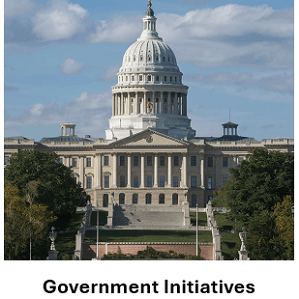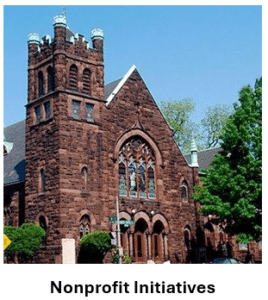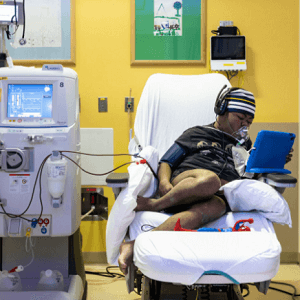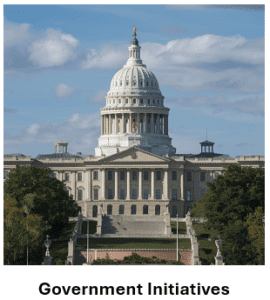News About Health Disparity Private Initiatives

“All of US” federal research program
Creating database to boost diverse medical research

Adventist HealthCare in Rockville, Maryland
Providing comprehensive prenatal care, education, and support services tailored to the needs of minority women throughout pregnancy

Advocate Health Care
Investing $1 billion to build state-of-art hospital and 10 neighborhood care locations on Chicago’s South Side

Alabama State University and drug company ViiV Healthcare
Offering HIV education and testing services to address greater impact of HIV on Black Americans

Allegheny Health Network
Targeting cardiovascular health disparities in Pittsburgh with Its “Every Heart Matters” program

American Board of Medical Specialties
Eliminating bias in certification exams, continuing education to ensure fair assessment practices, support health equity across medical specialties

American Diabetes Association and CVS Health Foundation
Improving maternal health outcomes for women, especially of color, with gestational diabetes in New York City

American Heart Association
Targeting social determinants of health to improve care of cardiovascular patients

American Heart Association
Providing financial and technical assistance to companies in Minnesota focused on addressing health disparities within their communities

American Heart Association
Investing $210+ million in scientific research on health inequities and expanding opportunities for underrepresented groups in science and medicine

American Heart Association
Investing $210+ million in scientific research on health inequities and expanding opportunities for underrepresented groups in science and medicine

American Medical Association
Expanding education opportunities through partnerships between Indian Health Service and accredited medical schools

American Stroke Association
Introducing new Spanish language website to address high rates of cardiovascular disease and stroke among Latino communities

Ark Church of Baltimore
Launching community-driven Initiative to combat diabetes and boost vaccination rates in Baltimore

Balm In Gilead
Gathering faith leaders, public health professionals, and community advocates to discuss strategies for improving health outcomes in Black communities

Black Breastfeeding Week
Seeking to improve breastfeeding outcomes and overall health for Black mothers and infants

Black Directors Health Equity Group
Increasing number of Black individuals serving on medical boards, which shape healthcare policies and practices

Bloomberg Philanthropies
Donating $9.5M to Expand Washington DC’s healthcare career training for high school students

Bloomberg Philanthropies’ Greenwood Initiative
Boosting historically Black medical schools with $600 million gift

CaringWire of Columbus, Ohio
Developing advanced analytics tools to predict health risks and outcomes based on social determinants to address potential health issues

Carol’s Daughter and Mama Glow Foundation
Launching video series to provide Black birthing people essential tools to advocate for their health

Cedars-Sinai
Joining national study to address cancer disparities in Asian Americans with culturally-tailored interventions to increase cancer screening

Centers for Disease Control and Prevention (CDC)
Partnering with national organizations and local affiliates to target nutrition, physical activity, and tobacco control in underserved populations

Centers for Disease Control and Prevention (CDC)
Utilizing data-driven strategies to address health disparities in breast and cervical cancer screening among underserved U.S. populations

Champions Coaching in Raleigh, North Carolina
Helping youth and underserved communities develop swimming skills and water safety awareness

Chicago Austin Neighborhood
Launching trolley tour to educate residents about local fresh food sources and promote healthier eating habits

City of Boston
Targeting three main causes of premature death among city residents

City University of New York
Enhancing the representation of Black and Latino communities in biomedical research and healthcare professions

CME Outfitters, provider of accredited continuing medical education
Collaborating with National Black Church Initiative to increase diversity in clinical trials and enhance cultural competency among healthcare providers

Common Ground Health and Rochester Regional Health Information Organization
Bridging gap between data analysis and community action to address health disparities more effectively

Community Foundation of Greenville, South Carolina
Funding development of new wellness, education, and outreach center for underserved communities in downtown Greenville

Community Projects, Inc
Encouraging Black prostate cancer survivors and patients to share their personal journeys on social media platforms to dispel myths and reduce stigma

Crossroads4Hope of New Jersey
Expanding services needed by individuals with cancer, particularly within low-income and marginalized communities

CVS Health Foundation and American Diabetes Association
Improving maternal health outcomes for women, especially of color, with gestational diabetes in New York City

Dana-Farber Cancer Institute
Launching Mobile Mammography Initiative to address breast cancer disparities in Black women

Distant Relatives
Providing crucial health care screening services to those struggling to access quality care in Washington DC

Emory University
Developing sensor to protect farmworkers from extreme heat

Favoritism and inequity in organ transplants leading to alarming disparities for minority patients.
Health disparities are starkly evident in the American organ transplant system, where favoritism and inequity have led to alarming outcomes for minority patients. A New York Times investigation reveals that the sickest patients, who should receive priority for lifesaving transplants, frequently find themselves overlooked. Last year, nearly 20 percent of organ transplants involved patients being skipped from waiting lists, often in favor of less critically ill individuals. This concerning pattern has led to deaths of individuals who, just prior to being bypassed, were close to receiving organ transplants. The investigation found that over the past five years, more than 1,200 people died after being skipped on waiting lists. Significant numbers of these instances disproportionately affected white and Asian patients, while Black candidates often face longer wait times and have worse outcomes. Stakeholders within the transplant system acknowledge that they sometimes deviate from established protocols to place organs more quickly, prioritizing expediency over fairness. As urgency drives decisions, the principle of fairness becomes increasingly warped, resulting in a mockery of the allocation system, as articulated by medical professionals. The consequences of these practices exacerbate disparities within healthcare, leaving minority communities vulnerable and eroding trust in a system that is meant to serve all equally. See: “Organ Transplant System ‘in Chaos’ as Waiting Lists Are Ignored” (February 26, 2025)

Fred & Pamela Buffett Cancer Center
Addressing cancer disparities in Nebraska by focusing on precision prevention and key risk factors specific to the state

Froedtert Hospital nurses and Medical College of Wisconsin dermatologists
Focusing on skin, hair, nail conditions more common in diverse communities

Hawaii Department of Health
Strengthening its Maternal Mortality Review Committee to address factors contributing to maternal deaths

Hawaii’s Waimea Clinic
Integrating traditional Hawaiian healing practices with modern medical care to build trust and improve health outcomes

Heartland Surrogacy, Iowa’s first surrogacy agency
Addressing critical reproductive health care disparities within Iowa’s Hispanic community.

Henry Ford Health
Bringing prenatal care directly into Detroit schools where infant mortality rates are significantly higher than national average

Illinois Institute of Technology
Addressing mental health care disparities with expertise of faculty members

Johns Hopkins Center for Indigenous Health
Starting Native American Health Hub in South Dakota to provide Native-specific healthcare option and train community members for healthcare careers

Mama Glow Foundation and Carol’s Daughter
Launching video series to provide Black birthing people essential tools to advocate for their health

Maricopa County, Arizona
Creating with Arizona State University a Well-Being Hub to enhance quality of life where disparity in life expectancy is most pronounced

Mass General Brigham and La Colaborativa
Launching affordable healthcare initiative for Boston’s underserved residents

Medicaid
Improving cultural competence of health care providers to reduce biases and improve patient-provider relationships

Medical College of Wisconsin
Increasing number of physicians focusing on underserved at-risk populations

MedStar Washington Hospital Center
Increasing access to prenatal and postpartum care in Washington DC’s wards with highest infant mortality

Mercy University
Empowering nursing students and educators to confront health inequities within their communities

Meritus Health of Hagerstown, Maryland
Convening healthcare providers across Maryland to tackle health inequities, workforce diversity, culturally responsive care

Michigan Coronavirus Task Force on Racial Disparities
Repurposing COVID-19 testing sites into Neighborhood Wellness Centers to tackle health disparities among marginalized communities.

Michigan Public Health Advisory Council
Strengthening public health infrastructure and improving communication to rebuild community trust to tackle health disparities

Mississippi Department of Health
Initiating a training program aimed at improving communication between healthcare professionals and Limited English Proficient patients

Montefiore Einstein academic health system in New York City
Providing advanced research training to postgraduate trainees from underrepresented groups in medicine.

Morgan State University
Exploring and mitigating non-medical structural forces driving inequities in maternal health

Morgan State University
Launching $171 million center to combat health disparities

MyOme and Broad Clinical Labs
Supporting Southern Research Program to bring genetics-driven health insights to Alabama free of charge to address healthcare disparities

Nashville Black Wellness Collective
Combining physical activities with community building and education within Black community

National Black Church Initiative
Promoting Maternal Outcomes Matter tour to provide educational workshops, health screenings, and support services to African American women

National Institutes of Health (NIH)
Funding Native American-led research on addiction and pain

National Institutes of Health (NIH)
Collaborating with local communities to address social determinants of health, such as access to healthcare, education, and economic stability

National Kidney Foundation
Raising awareness about kidney disease in Latino community, which is disproportionately affected

New York State
Supporting community-based groups that provide essential health services to underserved populations

New York’s Erie County Legislature
Launching new Office of Health Equity to address racial disparities

Nonprofit Colorado Access
Focusing on building trust within the Latino community to increase vaccination rates and address health needs

Nonprofit Colorado Access
Focusing on building trust within the Latino community to increase vaccination rates and address health needs

Nonprofit Common Threads
Empowering families in Miami with essential cooking skills, kitchen safety knowledge, nutrition education, and access to affordable, healthy foods

Northwestern Medicine
Launching program to increase transplant access for Black patients

Northwestern Memorial Healthcare in Chicago
Launching program to increase organ donation and transplantation rates among Hispanics

Oklahoma State University
Integrating training on cultural competency and health equity into medical curriculum

Penn State
Addressing obesity-related health disparities by tracking how frequently people visit locations that influence physical activity and food choices

Penn State College of Medicine
Reducing cancer disparities and improving health literacy in cardiovascular health, cancer, and diabetes for rural and underserved communities in Pennsylvania

Polk County, Iowa
Starting program to detect dementia early among Latino community

Preeclampsia Foundation
Launching Task Force to Combat Racial Disparities in Hypertensive Disorders of Pregnancy

Prisma Health of South Carolina
Addressing racial disparities in maternal health by providing doulas to Black mothers

Racial Disparities Task Force
Addressing high rates of hypertension-related maternal mortality and illness in U.S. Black women

Roosevelt University in Chicago
Expanding educational opportunities for Latino and low-income students in science, technology, engineering, and mathematics (STEM) fields

Rush University System for Health
Advancing health outcomes in Chicago neighborhoods by leveraging its business assets to improve community living conditions

Society for Behavioral and Cognitive Neuroscience
Working to ensure presentation of all human brains in scientific studies

Southern Arkansas University
Studying social factors contributing to health disparities among racial and ethnic minorities and rural communities in southwest Arkansas

Stanford University
Focusing on improving diabetes care for underserved communities

State of Nebraska
Seeking to reverse Black maternal healthcare disparities by improving healthcare infrastructure in underserved areas

Sutter Health, a medical network in California
Launching mobile mammography to bring screening to underserved communities in Oakland

Tulane University
Beginning $82 million research focusing on understanding root causes of chronic disease disparities in the Deep South

Tulsa’s Healthy Start program
Supporting pregnant women and new mothers to combat maternal mortality rates that disproportionately affect Black women in the state

U.S. Department of Agriculture (USDA)
Establishing 3 Nutrition Hubs to address food and nutrition security challenges in underserved communities in Hawaii, Texas, and Utah

U.S. Oncology Network
Addressing patients’ health-related social needs by joining with nation’s largest social services support network

UChicago Medicine AdventHealth
Conducting community health needs assessments to tailor health plans to better serve uninsured and underinsured individuals

University of Arizona College of Medicine
Producing bilingual physicians to provide equitable healthcare access to Spanish-speaking patients

University of Arkansas
Investigating how stress, illness, personal health concerns in healthcare workers may increase bias towards patients from minority groups

University of California Davis Comprehensive Cancer Center
Reducing cervical cancer disparities among underserved women by increasing Pap and HPV testing as well as HPV vaccination among their adolescent children

University of Cincinnati College of Allied Health Sciences
Working with community organizations to expand health care workforce to reflect the communities and patients they serve

University of Colorado
Addressing high rates of childhood obesity among U.S.-born children of Latino immigrant parents

University of Connecticut’s School of Nursing
Launching app to promote safe sex, communication with partners about sexual needs, and contraceptive-use among Black female adolescents

University of Florida Health
Training pharmacists to provide medication management and lifestyle counseling to Black patients with uncontrolled hypertension

University of Louisville
Addressing systemic health disparities through innovative, scalable solutions with $6.75 million grant from the Humana Foundation